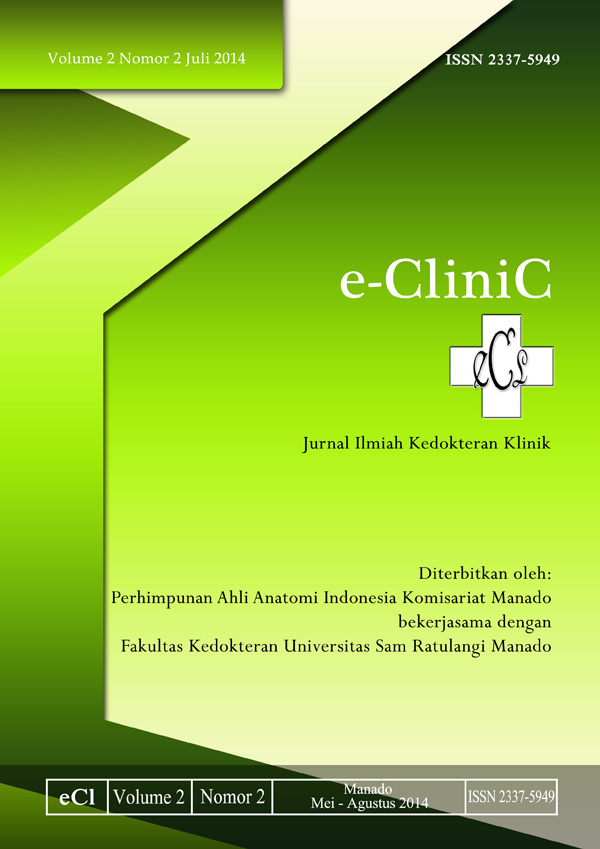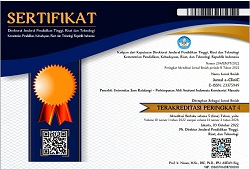PERBANDINGAN PENGETAHUAN TENTANG MANAJEMEN DIABETES MELITUS PADA MAHASISWA TAHAP SARJANA DAN PROGRAM PENDIDIKAN PROFESI DOKTER (P3D) FAKULTAS KEDOKTERAN UNIVERSITAS SAM RATULANGI MANADO
DOI:
https://doi.org/10.35790/ecl.v2i2.5194Abstract
Abstract: Diabetes mellitus (DM) is a health problem that increases the number of events globally. Medical doctor as the first line in the treatment of diabetes are required to have good knowledge about its management. Students of the Faculty of Medicine, University of Sam Ratulangi trained to become medical doctor were had good knowledge about management of diabetes melitus. The problem is what is the description of knowledge about DM management on undergraduate students and professional education programs of medical doctor (P3D) students. Objective: The study was to compared the level of knowledge about DM management among undergraduate students and P3D students of Faculty of Medicine, Sam Ratulangi University. Method: This study is a descriptive analytical with quantitative approach involving 80 subjects were selected based consecutive sampling and was answered the questionnaire about knowledge of DM management. Results: The subjects knowledge about DM management in undergraduate students from 40 subject result 1 subject (2.5%) are included in the category of good knowledge, 7 subject (17.5%) had moderate knowledge and 32 subjects (80%) are included of low knowledge. The subjects of P3D students result 3 subjects (7.5%) including good knowledge category, 25 subjects (62.5%) were categorized moderate knowledge and 12 subjects (30%) is low knowledge category. Conclusion: Knowledge level about DM management undergraduate student is still low. P3D student knowledge level about diabetes management is classified as moderate. Knowledge level about diabetes management on P3D students is better than undergraduate students.
Keywords: Knowledge, medical students, management of diabetes mellitus.
Â
Â
Abstrak: Diabetes Melitus (DM) merupakan masalah kesehatan yang angka kejadiannya meningkat secara global. Dokter umum sebagai lini pertama dalam penanganan DM dituntut untuk memiliki pengetahuan yang baik tentang manajemennya. Mahasiswa Fakultas Kedokteran Universitas Sam Ratulangi Manado yang dididik untuk menjadi dokter haruslah memiliki pemahaman yang baik tentang manajemen Diabetes Melitus. Permasalahannya adalah bagaimana gambaran pengetahuan mengenai manajemen DM pada mahasiswa tahap sarjana dan tahap program pendidikan profesi dokter (P3D). Tujuan: Penelitian ini bertujuan untuk membandingkan tingkat pengetahuan mengenai manajemen DM pada mahasiswa tahap sarjana dan tahap P3D Fakultas Kedokteran Universitas Sam Ratulangi Manado. Metode: Penelitian ini bersifat analitik deskriptif dengan pendekatan kuantitatif melibatkan 80 responden yang menjawab kuesioner pengetahuan mengenai manajemen DM. Hasil: Dari 40 responden mahasiswa tahap sarjana 1 responden (2,5%) termasuk dalam kategori pengetahuan baik, 7 responden (17,5%) termasuk kategori sedang dan 32 reponden (80%) termasuk kategori rendah. Pada 40 responden mahasiswa tahap profesi (P3D) diketahui 3 responden (7,5%) termasuk kategori pengetahuan baik, 25 responden (62,5%) termasuk kategori sedang dan 12 responden (30%) adalah kategori pengetahuan rendah. Simpulan: Tingkat pengetahuan mahasiswa tahap sarjana mengenai manajemen DM masih rendah. Tingkat pengetahuan mahasiswa P3D mengenai manajemen DM masih tergolong sedang. Tingkat pengetahuan manajemen DM mahasiswa P3D lebih baik dibanding mahasiswa tahap sarjana.
Kata kunci: Pengetahuan, mahasiswa kedokteran, manajemen diabetes melitus.
Downloads
How to Cite
Issue
Section
License
COPYRIGHT
Authors who publish with this journal agree to the following terms:
Authors hold their copyright and grant this journal the privilege of first publication, with the work simultaneously licensed under a Creative Commons Attribution License that permits others to impart the work with an acknowledgment of the work's origin and initial publication by this journal.
Authors can enter into separate or additional contractual arrangements for the non-exclusive distribution of the journal's published version of the work (for example, post it to an institutional repository or publish it in a book), with an acknowledgment of its underlying publication in this journal.
Authors are permitted and encouraged to post their work online (for example, in institutional repositories or on their website) as it can lead to productive exchanges, as well as earlier and greater citation of the published work (See The Effect of Open Access).







